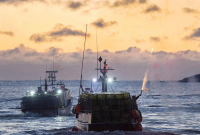Support strong Canadian climate journalism for 2025
Fisheries and Oceans Canada (DFO) has announced a $7-million satellite program to locate and track people who are fishing illegally near Ecuador's Galapagos Islands.
“Illegal fishing threatens the health of our fish stocks and takes resources away from hard-working, law-abiding fishers,” said Fisheries and Oceans Minister Bernadette Jordan in a press release. “We're investing in one of the leading, most innovative systems on the planet to ensure our fish stocks are protected, our fisheries remain lucrative, and the law is upheld at sea.”
The Dark Vessel Detection program uses satellite technology to detect “dark vessels,” ones that have turned off their location transmitting devices in order to avoid being caught, according to DFO.
It’s estimated that illegal, unreported and unregulated (IUU) fishing accounts for about 30 per cent of all fishing activity worldwide, representing up to 26 million tonnes of fish caught annually at a cost to the global economy of $10 billion to $23 billion a year, according to the Food and Agriculture Organization of the United Nations.
DFO awarded Ontario-based space technology company MDA — the maker of the Canadarm — with a three-year contract to supply the technology for the program. It will provide data and analysis to officials in Ecuador and the Forum Fisheries Agency, which represents 15 small island nations in the Pacific region, so they can spend their resources on enforcement to protect their fish stocks, DFO says.
MDA says the program will combine data from multiple satellite missions, including the Canadian Space Agency Earth observation satellite, RADARSAT-2.
The Dark Vessel Detection program is part of the $11.6 million Canada committed to ocean health at the 2018 G7 meeting.
DFO kicked off a smaller-scale program in June to track vessels in the Bahamas and Costa Rica, which saw “significant” fines to five foreign vessels, according to the department.
‘Inadequate traceability’ in Canada
Canada has been under fire for having illegal seafood in its supply chains.
Oceana Canada says the country has “inadequate traceability standards” to monitor its seafood supply chain. As a result, the Canadian economy is losing up to $93.8 million in tax revenue each year due to illegal and unreported fishing, according to an Oceana Canada report released in November. Meanwhile, Canadian fishers are missing out on up to $379 million in lost revenue, per the report.
The ocean conservation organization has been calling on the feds to develop a boat-to-plate traceability system that would track information about seafood products and disseminate it throughout supply chains.
Prime Minister Justin Trudeau tasked Jordan and Health Minister Patty Hajdu to tackle it in their 2019 mandate letters, but no timeline for this plan has been released.
This task, however, wasn’t included in Jordan’s or Hajdu’s subsequent 2021 letters.
Yasmine Ghania / Local Journalism Initiative / Canada’s National Observer






Comments